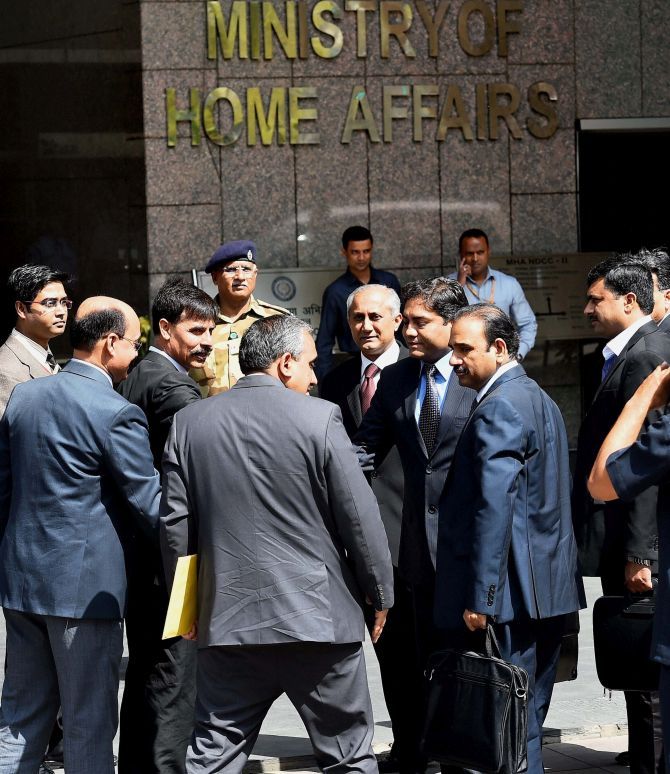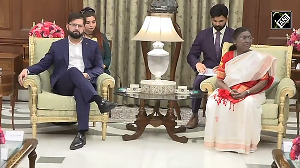 If Pakistan finally and officially rules out the possibility of an Indian investigation team’s reciprocal visit for the Pathankot probe, it should also be seen as the Chinese “hidden veto” in the India-Pakistan bilateral context, says Rajeev Sharma.
If Pakistan finally and officially rules out the possibility of an Indian investigation team’s reciprocal visit for the Pathankot probe, it should also be seen as the Chinese “hidden veto” in the India-Pakistan bilateral context, says Rajeev Sharma.
International diplomats stationed in the Indian subcontinent keeping an eye on India and Pakistan know that everything in this difficult bilateral relationship currently hinges only on one single thread: whether Pakistan will allow India a reciprocal visit by its investigation team to probe the Pathankot terror attacks.
But these wise people will do well to keep China in the frame of India-Pakistan bilateral relations.
The reasons for this are not far to seek. China has become the elephant in the room for all India-Pakistan engagements. Pakistan's India policy these days is being governed by the China factor.
In fact, Pakistan and China have synergised and synchronised their diplomatic positions in such a way that India by now knows that their respective diplomatic positions vis a vis New Delhi are jointly choreographed..
In other words, India's two nuclear armed neighbours, with each of whom India has fought wars, are in a state of diplomatic tango.
Put even more simply, straws in the winds suggest that Pakistan won't take a major diplomatic step on India without concurrence from the Chinese and the Chinese too would be taking Pakistan on board before taking a major step with the Indians.
Therefore, Pakistan won't be allowing an Indian investigation team into its territory before consulting the Chinese. If Islamabad were to do that and allow an Indian investigation team a reciprocal visit in the Pathankot case, it should not be merely seen as an NOC or No Objection Certificate from Rawalpindi, the seat military power in Pakistan, but also as an NOC from China.
China has a lot of issues to contend with as far as its own diplomatic play-out with India is concerned. These days China is smarting under an unprecedented diplomatic rebuff by the Indians whereby India, while pursuing a tit-for-tat policy, has given visas to Uighur leaders for attending a conference India this month end.
China has never been stung by India like that ever before. It has two options to counter this. One, China can come up with its own counters in the India-China bilateral context. Two, it doesn't have to waste its breath and be seen as unnecessarily upping its ante with the Indians when it has the luxury of micro-managing Pakistan's India policy in a way that its own diplomatic goals are met without spoiling relations with India.
The chances are that China would first exhaust this easy option by simply exercising its diplomatic levers with Pakistan.
A possible Chinese game plan can be of pitting India and Pakistan against each other, thus emulating the Americans who have been playing these games for decades in the region.
Therefore, the possible scenario of Islamabad allowing an Indian investigation team to visit Pakistan should not be seen in the narrow context of India-Pakistan ties but in context of the larger India-Pakistan-China triangle.
The converse would also hold true. Which means that Pakistan finally and officially ruling out the possibility of an Indian investigation team visiting on a reciprocal basis for the Pathankot probe should also be seen as the Chinese “hidden veto” in the India-Pakistan bilateral context.
So, a Pakistani ‘No’ should then be seen in this light with the Chinese as backroom boys.
If this were to happen it would be dangerous for India-Pakistan bilateral relations and would inevitably inject a new dimension. One only hopes that the Pakistanis are sensible enough to drive their relationship with the Indians themselves rather than through the Chinese prism.
But given the state of relations between India and Pakistan on the one hand and India and China on the other, this dreadful scenario of the Chinese choreographing Pakistan's India policy can't be ruled out.
The complex India-Pakistan-China triangle has become even more complicated.
Image: Members of the Pakistan’s Joint Investigation Team formed to probe the Pathankot airbase attack, arrive at the National Investigation Agency headquarters in New Delhi on March 29, 2016. Photograph: Kamal Singh/PTI Photo.
Rajeev Sharma is an independent journalist and strategic analyst who tweets@Kishkindha.











 © 2025
© 2025